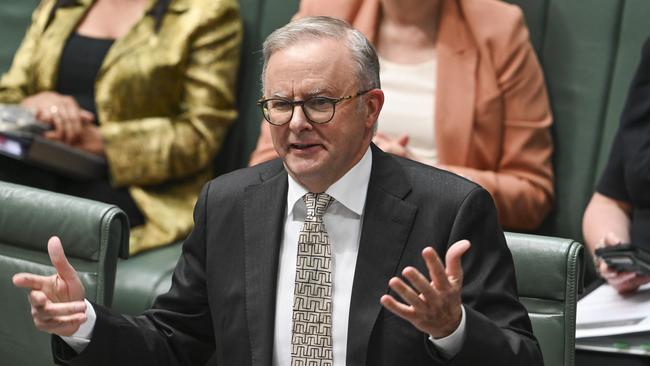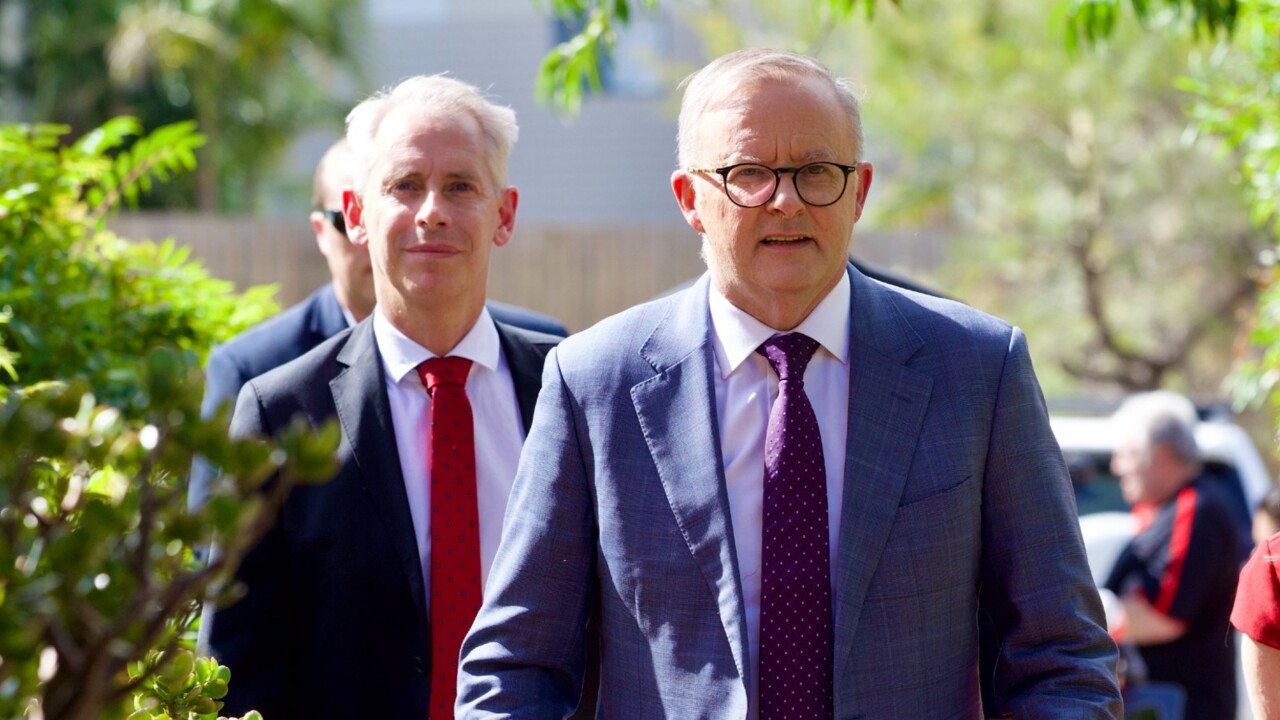The soft Labor Left’s rush to hard love on detainees
Labor’s snap bid to regain control of migration law faces Senate scrutiny, as the Coalition weighs whether to support the extraordinary powers.

Non-citizens who exhaust all avenues to stay in Australia face a mandatory one-year term in jail if they fail to go home and thousands of people from Iran, Iraq and South Sudan could be banned from entering the country amid a snap Labor bid to help regain control of migration law.
In a pre-emptive legislative strike after months of chaos on immigration following the High Court’s NYZQ ruling, which overturned indefinite detention, Anthony Albanese and Immigration Minister Andrew Giles used Tuesday’s parliamentary sitting to rush through a bill that would allow the government to deport detainees and non-citizens on certain bridging visas who refused to co-operate with authorities.
The bill comes weeks before the High Court rules on the case of an Iranian man who refuses to go home, claiming he would be persecuted over his sexuality.
The new powers would allow Mr Giles to try to force him to return home, regardless of that decision, or go to jail.
More than 100 detainees who are refusing to co-operate with deportation could also be released if the man, ASF17, wins the case.
The changes unveiled on Tuesday would be directed primarily at the 152 former detainees who were released following last year’s High Court decision, the government said.
Labor’s legislation was driven through the House of Representatives mere minutes before question time with the backing of the Coalition, in some of the most chaotic scenes in parliament since the ALP returned to power in 2022. With the Greens labelling it an alternative pathway to indefinite detention and refugee groups comparing the new Labor policy to former US president Donald Trump’s Muslim ban, the government is facing fights on three fronts.
Tuesday was also marked by a growing dispute with state premiers over disability funding, a debate in which some Labor MPs were increasingly nervous that the commonwealth was losing control over, and disappointment from environmentalists over a backflip on its emissions standards regimes for new cars.
The Coalition slammed the government’s “sham” and “complete and utter mess” of a process to produce changes to the Migration Act – which the government wants passed through parliament on Wednesday before it rises for the Easter break – but won Senate support for a two-hour inquiry held on Tuesday night to scrutinise the legislation.

Under the government’s Migration Amendment (Removal and Other Measures) Bill, which the Coalition, Greens and crossbenchers were briefed on early on Tuesday morning, despite the legislation being dated from last week, non-citizens with no right to be in Australia would be forced to leave if they were not heading home voluntarily.
Non-citizens who did not co-operate with the government’s removal efforts could be forced to apply for a passport or attend meetings with officials from that country to facilitate their travel.
If they fail to comply with directions, they would be committing a crime and face at least one year in jail and a maximum of five years.
Mr Giles would also be handed extraordinary powers to designate a country that refuses to accept returns of their own citizens a “removal concern country”.
That would prevent most nationals living in that country from making visa applications to come here.
There were safeguards included in the bill that allowed some non-citizens to stay in Australia and foreign nationals from affected countries who were close family members of Australian citizens and permanent residents to continue applying for visas.
“Unfortunately, examples of non-cooperation with the government’s removal efforts have been going on for far too long against the expectations of the Australian community and undermining the integrity of our migration laws,” Mr Giles said.

“The government is determined to address this issue and to ensure this key aspect of our immigration system is better, stronger and fairer. Put simply, we need these important tools to strengthen our migration system.”
The Coalition left open the possibility of rejecting Labor’s emergency migration removal powers amid fears it could spark unintended consequences.
Appearing before the urgently convened Senate committee hearing to discuss the government’s bill, Department of Home Affairs secretary Stephanie Foster and departmental officials said first drafting instructions for the legislation had been issued on March 5.
Asked to explain why the bill had been brought on at such short notice, Ms Foster said it was aimed at closing “gaps” that had been identified in February.
“As we are identifying gaps in our system, we are moving as quickly as we can to fill those gaps. And this is one we believe is a significant issue to resolve within a migration system for its broader integrity,” she said.
Opposition home affairs spokesman James Paterson said the Coalition’s greatest concern, other than the government’s “rushed and botched process” to produce the legislation, was the possibility for unintended consequences that could encourage people-smugglers. “We don’t want to see the people-smuggling trade started again, but there’s some signs it has. How would this exacerbate it? Well, for example, if the minister designates Iran as a relevant country of concern, that means no one in Iran can apply lawfully for a visa to come to Australia unless they qualify for an exception,” he told Sky News.
“That may mean someone from Iran seeking to come to Australia may instead choose to come via boat; we don’t want to inadvertently encourage that behaviour.”
Greens leader Adam Bandt attacked the government for pushing its emergency migration powers through parliament, declaring Labor had put forward nothing that justified MPs “losing the usual rights that everyone in this parliament has to consider such important legislation”.
“This is extraordinary,” he said.
“On our reading of the legislation, this could occur – a mum who refuses to sign a passport application for her children to be returned to Iran, where they have a fear of persecution, could be put in jail … not only put in jail but with a mandatory minimum sentence.
“Labor’s party platform says Labor opposes mandatory minimum sentencing. No you don’t. It’s in this bill.”
University of Sydney constitutional law expert Anne Twomey said the legislation did not on the face of it pose an obvious constitutional risk.
“It looks valid,” she said. “And the reason for that is that to the extent that there is punishment involved, detaining people in prison, for example, it’s a consequence of the court convicting and punishing a person.
Under the separation of powers, that’s the way it has to be done.”
Professor Twomey also disputed criticism of the bill that it effectively perpetuated a new form of indefinite detention because there was a “finite end” to the period of imprisonment for refusing to follow the minister’s directions.
Refugee Legal executive director David Manne said there could be future legal challenges to the new powers.







To join the conversation, please log in. Don't have an account? Register
Join the conversation, you are commenting as Logout